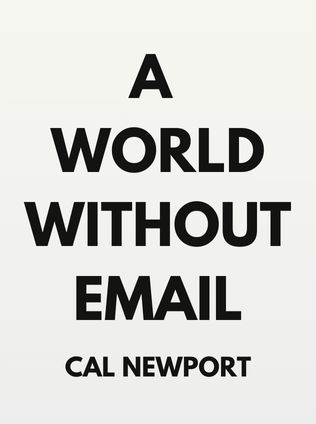
A World Without Email
Reimagining Work in an Age of Communication Overload
By Cal Newport
Published 03/2021
About the Author
Cal Newport is an associate professor of computer science at Georgetown University, specializing in the theory of distributed systems. Beyond his academic contributions, Newport is a New York Times bestselling author known for his insightful exploration of the intersection between technology and culture. His works, including "Digital Minimalism" and "Deep Work," have been translated into over thirty languages. Newport also regularly contributes to prestigious national publications such as The New Yorker, The New York Times, and Wired, and is a frequent guest on NPR, where he discusses the implications of digital communication on our lives.
Main Idea
In "A World Without Email: Reimagining Work in an Age of Communication Overload," Cal Newport challenges the conventional wisdom that digital communication tools like email and instant messaging enhance productivity. Instead, Newport argues that these tools create a hyperactive hive mind, leading to decreased productivity and increased stress. He proposes a radical shift away from the "tyranny of the inbox" to unlock greater productivity and improve overall well-being. Newport provides compelling evidence and practical strategies for reducing our reliance on email and rethinking how we work.
Table of Contents
- The Case Against Email
- Principles of a World Without Email
- The Attention Capital Principle
- The Process Principle
- The Protocol Principle
- The Specialization Principle
The Case Against Email
Cal Newport begins his book by making a compelling case against the prevalent use of email in modern workplaces. He presents three primary arguments to support his stance: email reduces productivity, makes us miserable, and has a mind of its own.
Email Reduces Productivity
Email, while convenient, often leads to a fragmented style of work, particularly in knowledge-based professions. Newport cites research showing that employees frequently shift tasks, approximately every three minutes, primarily due to email interruptions. He notes, "To say we check email too often is an understatement; the reality is that we’re using these tools constantly." This constant multitasking hinders deep, focused work and diminishes overall productivity.
"The core finding of the paper is that once you eliminate formally scheduled meetings, the employees they followed shifted their attention to a new task once every three minutes on average." - Cal Newport
Newport emphasizes that the problem is not the email tool itself but how we use it. The constant barrage of messages creates a "hyperactive hive mind" that disrupts our ability to concentrate and perform meaningful work. This hyperactivity is detrimental to productivity, as the human brain is not designed to switch tasks frequently without a loss in efficiency and quality.
Sign up for FREE and get access to 1,400+ books summaries.
You May Also Like
The Subtle Art of Not Giving a F*ck
A Counterintuitive Approach to Living a Good Life
By Mark MansonRich Dad Poor Dad
What the Rich Teach Their Kids About Money - That the Poor and Middle Class Do Not!
By Robert T. KiyosakiHow To Win Friends and Influence People
The All-Time Classic Manual Of People Skills
By Dale CarnegieQuiet: The Power of Introverts
The Power of Introverts in a World That Can't Stop Talking
By Susan Cain



















